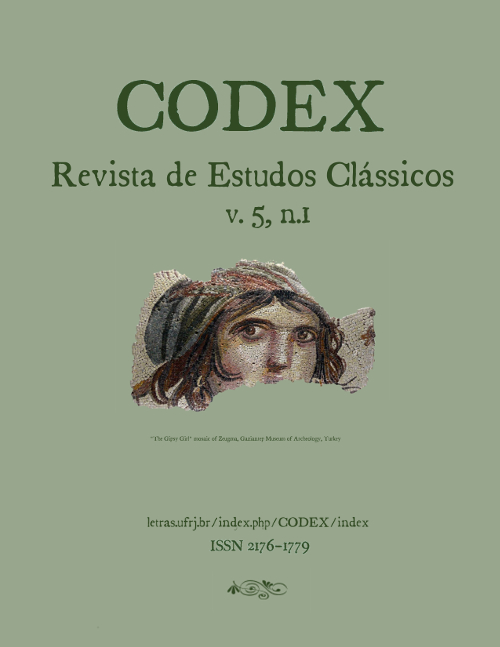O Elogio de Helena de Isócrates: réplica a Górgias e a unicidade de seu discurso epidítico
DOI:
https://doi.org/10.25187/codex.v5i1.10857Palavras-chave:
Isócrates, Górgias, Elogio de Helena, gênero epidíticoResumo
Por volta de 390-80 a.C., o ateniense Isócrates compõe um de seus primeiros discursos como educador, o Elogio de Helena. De acordo com boa parte da crítica, esse discurso parece ser uma réplica ao famoso Elogio de Helena de Górgias, que, segundo Isócrates (§14), teria composto não um encômio, mas uma apologia em nome da rainha espartana. No encômio isocrático, percebemos certa dissonância entre o proêmio e o restante da obra. Com efeito, ainda não temos no proêmio o tom encomiástico esperado, mas ele se configura, ao contrário, como uma invectiva a grupos de sofistas contemporâneos de Isócrates, e culmina, ao final, com uma crítica alusiva ao sofista de Leontine. Destarte, o que os sofistas do séc. IV a.C. teriam em comum com a mítica Helena? Em outras palavras, haveria algum fio condutor que assegurasse uma unicidade discursiva nesse exercício epidítico de Isócrates? O presente trabalho tem por finalidade discutir essas questões e rever como elas vêm sendo debatidas por alguns comentadores de Isócrates, partindo de Aristóteles na Retórica até a recepção do problema entre alguns dos estudiosos de Retórica Clássica do séc. XX.
Downloads
Downloads
Publicado
Como Citar
Edição
Seção
Licença
A Codex - Revista de Estudos Clássicos utiliza uma licença Creative Commons - Atribuição-NãoComercial 4.0 Internacional.
Os autores dos trabalhos aprovados autorizam a revista a, após a publicação, ceder seu conteúdo para reprodução em indexadores de conteúdo, bibliotecas virtuais e similares.
A revista se permite o uso dos trabalhos publicados para fins não comerciais, incluindo o direito de enviar o trabalho para bases de dados de acesso público.










